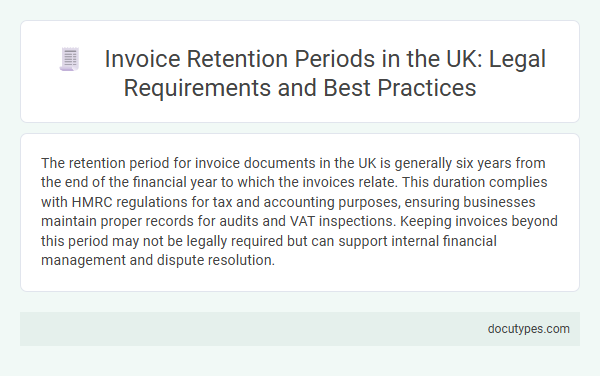The retention period for invoice documents in the UK is generally six years from the end of the financial year to which the invoices relate. This duration complies with HMRC regulations for tax and accounting purposes, ensuring businesses maintain proper records for audits and VAT inspections. Keeping invoices beyond this period may not be legally required but can support internal financial management and dispute resolution.
Introduction to Invoice Retention in the UK
In the UK, the retention period for invoice documents is a crucial aspect of maintaining compliance with tax and accounting regulations. Businesses must retain invoice records for a specified duration to ensure proper financial auditing and reporting. Understanding these retention requirements helps companies avoid penalties and supports accurate bookkeeping.
Legal Definition of Invoice Retention Periods
| Aspect | Details |
|---|---|
| Legal Definition | The retention period for invoice documents in the UK is governed by tax and accounting regulations requiring businesses to keep records that support their tax returns and financial statements. |
| Retention Period Duration | HM Revenue & Customs (HMRC) mandates that invoices and related financial documents must be retained for a minimum of six years from the end of the financial year to which they relate. |
| Purpose of Retention | Retention ensures compliance with VAT regulations, provides evidence for tax audits, and supports accurate bookkeeping and financial reporting. |
| Document Types Included | Sales invoices, purchase invoices, credit notes, and related supporting documents fall under this retention requirement. |
| Exceptions | If companies are involved in litigation, investigations, or disputes, invoice documents may need to be retained beyond six years. |
| Format of Retained Invoices | Invoices can be stored in either paper or electronic formats, provided they are clear, complete, and accessible for inspection by HMRC. |
Key UK Laws Governing Invoice Storage
In the UK, the retention period for invoice documents is generally six years, as mandated by the Limitation Act 1980. The Companies Act 2006 requires businesses to keep accounting records, including invoices, for at least six years from the end of the financial year they relate to. You must also consider HMRC regulations, which demand invoice retention for tax purposes to ensure compliance during audits or investigations.
HMRC Requirements for Invoice Retention
What is the retention period for invoice documents in the UK according to HMRC requirements? HMRC mandates that businesses retain invoice documents for a minimum of six years from the end of the last tax year they relate to. This retention period ensures compliance with tax regulations and facilitates audits or investigations by HMRC.
VAT Implications on Invoice Retention
Invoices in the UK must be retained for a specific period due to VAT regulations. The retention period ensures compliance with tax authority requirements and supports accurate financial reporting.
- Retention Period for VAT Records - You must keep VAT invoices for at least six years from the end of the last financial year they relate to.
- HMRC Compliance - The retention period allows HM Revenue and Customs to verify VAT payments and claims during audits.
- Digital and Paper Invoices - Both electronic and paper invoices are subject to the same retention rules under UK VAT law.
Best Practices for Digital and Paper Invoices
In the UK, the retention period for invoice documents is typically six years, as required by HM Revenue & Customs (HMRC) for tax and accounting purposes. This applies to both digital and paper invoices to ensure compliance with legal regulations.
Best practices for digital invoices include secure cloud storage with regular backups and controlled access to prevent data loss or unauthorized use. For paper invoices, it is advisable to store them in a dry, organized environment, ideally in labeled files or cabinets to maintain easy retrieval and protection from physical damage.
Industry-Specific Retention Guidelines
In the UK, invoice document retention periods vary depending on the industry and regulatory requirements. Businesses must adhere to specific guidelines to ensure compliance with tax, financial, and legal obligations.
- General Business Requirement - Invoices must be retained for a minimum of six years to comply with HMRC and Companies House regulations.
- Construction Industry - Retention periods extend to up to 12 years due to potential long-term contract disputes and statutory limitation periods.
- Financial Services Sector - Firms often retain invoice records for seven years or longer in accordance with the Financial Conduct Authority (FCA) rules.
Consequences of Non-Compliance
In the UK, the retention period for invoice documents is typically six years for tax and accounting purposes. This requirement ensures that you have the necessary records available for audits and legal verification.
Failure to retain invoice documents for the mandated period can result in penalties from HM Revenue and Customs (HMRC). Non-compliance may lead to fines, increased scrutiny, and difficulties in defending tax positions during investigations.
Strategies for Secure Invoice Archiving
In the UK, the retention period for invoice documents is typically six years, as mandated by HMRC for tax and accounting purposes. It is essential to adhere to these regulations to avoid legal complications and ensure compliance during audits.
Effective strategies for secure invoice archiving include using encrypted digital storage solutions and implementing regular backup procedures to safeguard data integrity. Organizing invoices systematically with searchable metadata enhances retrieval efficiency and reduces administrative burden. You should also establish access controls to protect sensitive financial information from unauthorized use.
What Is the Retention Period for Invoice Documents in the UK? Infographic

